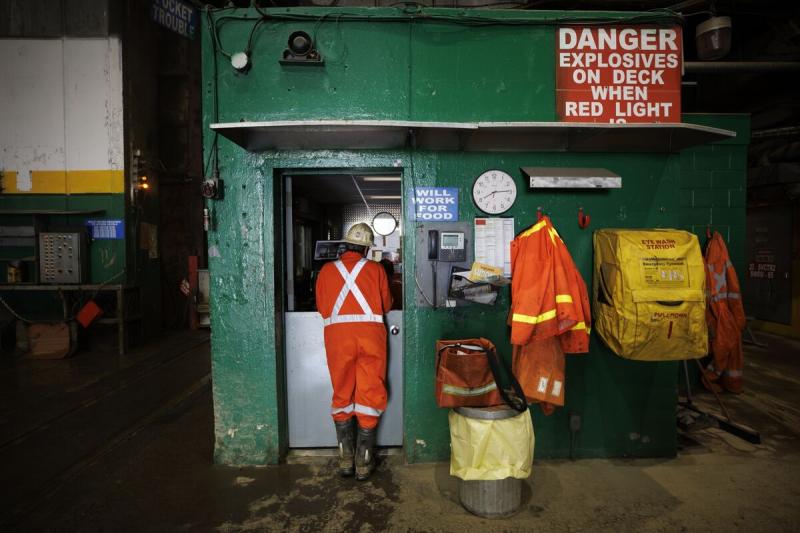It’s Getting Harder to Find Mining Engineers a Green World Needs
By: Tiffany Tsoi and Mark Burton (Bloomberg)


Michael Bloomberg once said "I could teach anybody, even people in this room, to be a farmer. It's a process. You dig a hole, you put a seed in, you put dirt on top, add water, up comes the corn. Now comes the information economy, and the information economy is fundamentally different, because it's built around replacing people with technology and the skillsets that you have to learn are how to think and analyze. That is a whole degree level different. You have to have a different skillset, you have to have a lot more grey matter." Looks like Bloomberg needs to teach more low-intellect suckers to become miners. After all, it's just a process. Dig a hole and sift through the dirt for the good stuff.
The fact of the matter is that if civilization had to rely on Michael Bloomberg's gray matter then we'd all starve in the dark.
(BTW, the article has been seeded in its entirety, including images, since Bloomberg hides behind a cheat wall. And the gray matter at Bloomberg apparently uses graphic coding as a swindle so that had to be fixed. Maybe Mike will invest in artificial intelligence which doesn't require any gray matter at all.)

Digging up the metals that go into power grids and electric cars is crucial to the energy transition. While the mining industry has plenty of reserves to tap, it faces a worrying shortage of young workers needed to get materials out of the ground.
In regions like Canada and the US, enrollment or graduation from university courses related to mining engineering slipped in recent years. The dilemma adds to the challenges miners face as they scramble to boost output of everything from copper and nickel to cobalt and lithium, just as many nations view supplies as a matter of national security and users rush to secure metal.
Fewer students want to be geologists or engineers, partly due to mining’s negative image regarding pollution, human rights and gender equality . That’s leaving the industry with an aging workforce and forcing it to recruit from outside the traditional university talent pool, such as through apprenticeship programs and internal training.
“There’s been a bit of a lost decade in people going through university in mining courses — that’s proving to really come to crunch point now,” said Alison Allen, deputy managing director at UK-based mining consultancy Wardell Armstrong. “There are too few graduates filling needs.”
Sources: Colorado School of Mines, StatCan Note: Enrollment numbers for the Colorado School of Mines are specifically in geophysical engineering, mining engineering, and geological engineering courses.
The waning interest is clear in some of the world’s key mining jurisdictions. At the Colorado School of Mines, total enrollment in mining, geophysical and geological engineering undergraduate degree courses last year was down about 35% from almost a decade ago. In Canada, mining and mineral engineering graduates dropped by a third between 2016 and 2020, according to Statistics Canada data.
It’s a similar story at the UK’s prestigious Camborne School of Mines, traditionally an important feeder school for the global industry. The number earning degrees from its undergraduate mining engineering course fell in recent years, with new intakes halted in 2020. The school this year announced new programs for mining employees.
UK mining faces a big challenge to meet its needs, according to Rhys Morgan, an engineering and education director at the Royal Academy of Engineering. Some 80% of the 1,250 mining engineers registered with the UK’s Engineering Council are over 50, and 40% are at least 60, he said.
There are already major labor shortages in American mining, leading to significant cost increases, Walter Copan, a vice president at the Colorado School of Mines, said in June.
Attracting Talent
Efforts to tackle graduate shortages include new routes into work and in-house training. For example, Wardell Armstrong says the industry has opened apprenticeship positions to help fill some technician and junior roles.
Coping with fewer workers isn’t new. More efficient output means heavyweights BHP Group and Rio Tinto Group are producing much more iron ore than a decade ago — with a lot fewer workers. AI and automation may further reduce the sector’s reliance on skilled labor, and Rio’s tech graduate roles rose 15% this year.
Sources: Rio Tinto, BHP Note: BHP worker numbers include contractors
There’s also a need for more non-engineering jobs, particularly with sustainability and social issues increasingly in the spotlight. Anglo American Plc says its focus is shifting to include graduates with degrees in social and environmental sciences and data analytics.
Plus, companies can get greater access to better interest rates and finance if they can prove their ESG standing, Wardell Armstrong’s Allen said.
Job Prospects
The drop in mining graduates means that those who do choose to go into the industry have a chance of a lucrative career.
“I was bluntly told that if I have a master’s at CSM, I could walk into a job,” said Michael Dinata, who’s finishing a master’s course at the Camborne School of Mines after studying politics. Yet he’s found some people are surprised at his choice, given the stigma surrounding mining.
“I found that ironic, because the entire infrastructure of technology is built on metal,” he said.
Enticing more students could be crucial to avoiding a potential shortage of new geologists and engineers in the coming years and decades. Legislation was introduced in the US this year that would provide grants to help mining schools tackle declining enrollment.
“There is a very challenging market competing for engineering skills,” the Royal Academy of Engineering’s Morgan said. “A fresh supply of new talent is critical to mine the materials that will enable the successful transition to electrification to meet net-zero ambitions.”
It's Michael Bloomberg. What rules?









The gray matter is whining people listening to Michael Bloomberg's condescending elitism. Everybody wants gray matter jobs.
So, where's the artificial intelligence to do the dirty work?
I have niece who graduated with a mining engineering degree from VA Tech and is in a Grad degree while working for a salt mining company. I was surprised at something as ubiquitous as salt could pay such a high starting salary.
Perhaps demand is high because graduation rates are low. You need math and science skills and we seem to be lagging in those disciplines in our school system.
"I could teach anybody, even people in this room, to be a farmer. It's a process. You dig a hole, you put a seed in, you put dirt on top, add water, up comes the corn...."
Proof that ANYONE could be a farmer. I once took an aptitude test that indicated that I should be a farmer. However, I ended up being a Queen's Counsel lawyer, a high school English teacher, and a master movie quiz creator. But one of the smartest things I ever did in my life was to marry a woman who grew up on a farm.